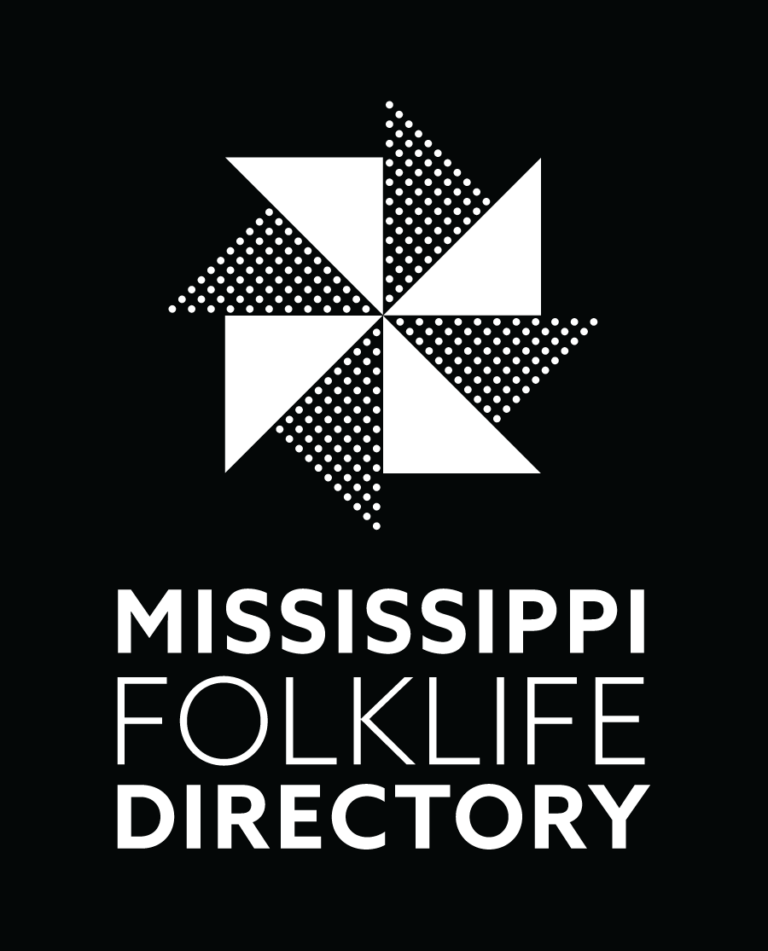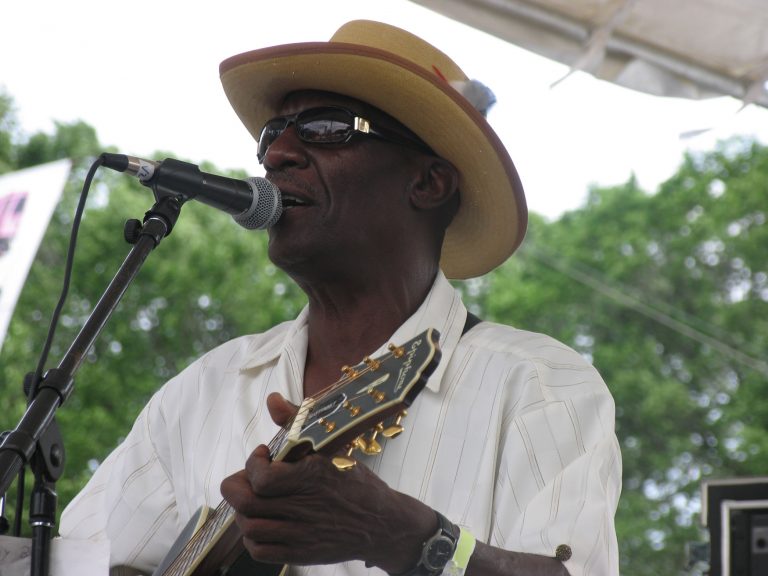Jimmy “Duck” Holmes is the proprietor of one of the oldest juke joints in Mississippi, the Blue Front in Bentonia. In the mid-2000s he began performing blues actively after many years of performing casually and has already garnered several awards and many accolades. He is a practitioner and conscious advocate of a distinctive blues style from his hometown whose most famous proponent was blues pioneer Skip James.
Holmes was born to sharecroppers Carey and Mary Holmes in 1947, the year before they opened the Blue Front Café. He was one of ten children and his parents also raised four children of Mary’s deceased sister. The children all grew up partially at the Blue Front, which served hot meals, sold groceries, housed a barbershop, and sold bootleg corn liquor to both its African American customers and to whites who would buy it out of the café’s back door. With the money they earned from the café and harvesting cotton, the Holmes sent most of their children to college.
During the segregation era, the Blue Front was subject most of the time to a 10:00 pm curfew, but during the cotton harvest, it stayed open 24 hours a day to accommodate workers processing cotton. Another segregation-era restriction was that the café could not serve Coca-Cola, which was reserved for whites. They instead sold brands such as Nehi but began selling Coca-Cola after the end of official segregation.
Musical performances at the café have historically been mostly informal, and notable out-of-towners who played there included James “Son” Thomas and Sonny Boy Williamson II. It also hosted musicians who played in what has been called the “Bentonia School” of the blues, which is characterized by distinctive tunings (E-Minor and open D-Minor), the use of falsetto, dark lyrical themes, and an overall eerie” quality.
The most famous artist from Bentonia who played in this style was Nehemiah “Skip” James (1902-1969). James learned to play guitar from local musicians including Henry Stuckey, who was never recorded and also learned to play the piano. He recorded on both instruments for Paramount Records in 1931, resulting in influential songs including “Devil Got My Woman,” “Hard Time Killing Floor,” and “22-20 Blues,” which Robert Johnson recorded as “32-20 Blues.” After his “rediscovery” in the 1960s, James recorded several albums and performed on the folk circuit, introducing his seemingly idiosyncratic style to a new generation.
In the mid-‘60s musicologist David Evans traveled to Bentonia to conduct research and found that other artists shared James’ style, notably Jack Owens (1904-1997), who ran a juke joint in Bentonia for many years, and Cornelius Bright. Evans’ field recordings of Owens were released on the 1971 Testament album It Must Have Been the Devil, and in subsequent decades Owens, together with his partner, blind harmonica player Bud Spires, performed at various festivals and was often visited at home by blues pilgrims.
Holmes, who never met Skip James, studied the music of Owens, learning songs including “Cherry Ball,” “Hard Times,” “I’d Rather Be the Devil,” but didn’t perform very actively until relatively recently. He promoted blues through the founding in 1972 of the Bentonia Blues Festival, which took place annually until the mid-‘90s and was revived in 2006. He took over the Blue Front in 1970 after the death of his father and beginning in the ‘80s the café became a popular destination for blues tourists, including annual visits by busloads of Japanese fans. In 1995 a commercial for Levi’s 501 jeans was filmed there.
Various blues researchers including Alan Lomax recorded Holmes beginning at least in the ‘70s, but until recently his only vocal appearance on record was one song, “Devil’s Blues,” that he performed together with Cornelius Bright and which appeared on the Austrian Wolf label compilation album Giants of Country Blues Volume 2. In 2006 the St. Louis-based record label Broke & Hungry released Holmes’ debut CD Back to Bentonia. He was joined on the record by Spires and drummer Sam Carr, and in addition to some original songs, Holmes also covered the Bentonia standards “Hard Times” and “I’d Rather Be the Devil.”
The CD was well-received and garnered several Living Blues Awards and to multiple festival bookings, including the Chicago Blues Festival and the Arkansas Blues and Heritage Festival. Holmes, who normally works as an educator, has traditionally been a somewhat reluctant performer but has enjoyed the opportunity to share his music and talk about the Bentonia tradition. “You don’t get nervous when you’re doing your hobby,” he says of performing.
In 2007 Broke and Hungry released a second CD, Done Got Tired of Tryin’, which followed a similar formula, and included James’ “Cherry Ball.” The CD was nominated for a 2008 Blues Music Award for Acoustic Album of the Year, and National Public Radio listed it as one of the “Top 10 Blues Albums” of the year. Holmes also received national publicity in August 2007 when a Mississippi Blues Trail historic marker was dedicated in honor of the Blue Front Café.
Other members of Holmes’ family who are involved in the blues include his brother John and cousin Otha, who both sing and play guitar, and his sister Mary Alice Towner, who started a blues and gospel festival in Marks, Mississippi in 2000.
-Scott Barretta
Related websites:

